How to Improve Hotel Sales: 15 Proven Strategies to Boost Revenue
Oct 3, 2025
 Mika Takahashi
Mika TakahashiPopular Categories
Hotel Technology & InnovationHotel Operations OptimizationDigital MarketingIndustry TrendsRevenue ManagementHospitality Industry
Popular Categories
Trending Post
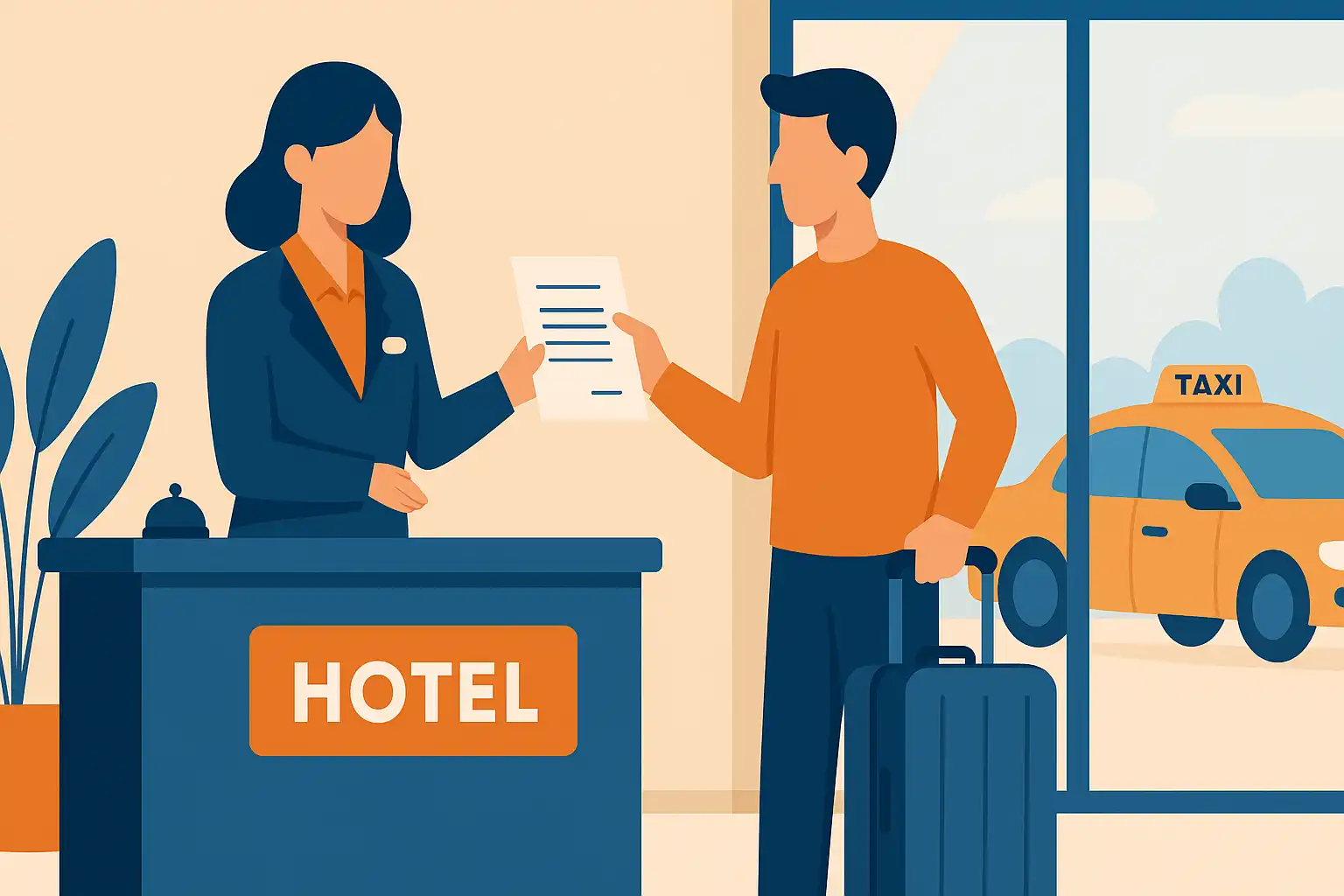
Hotel Walk Letter Template: Professional Guest Communication
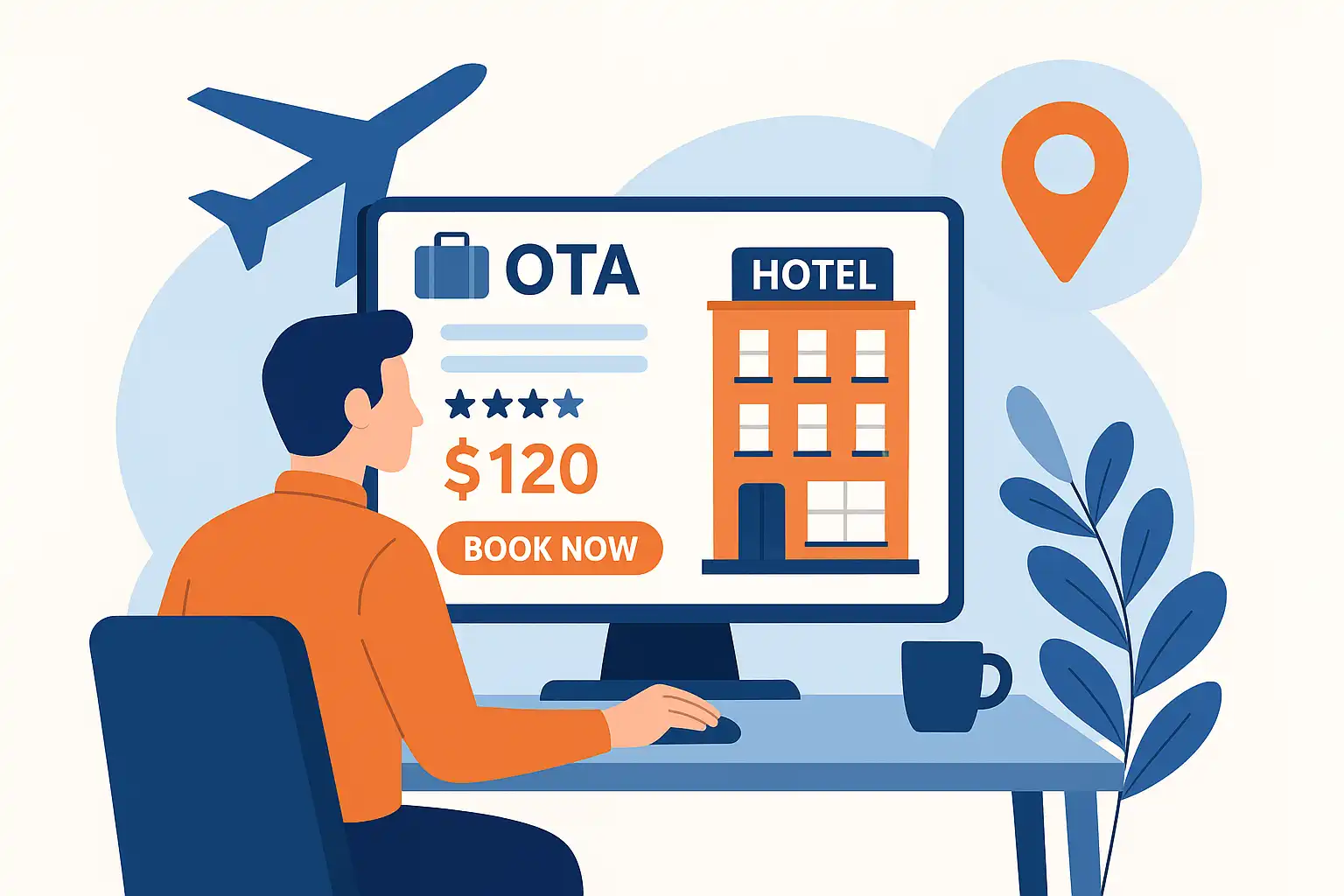
Online Travel Agents: What They Are and How They Work
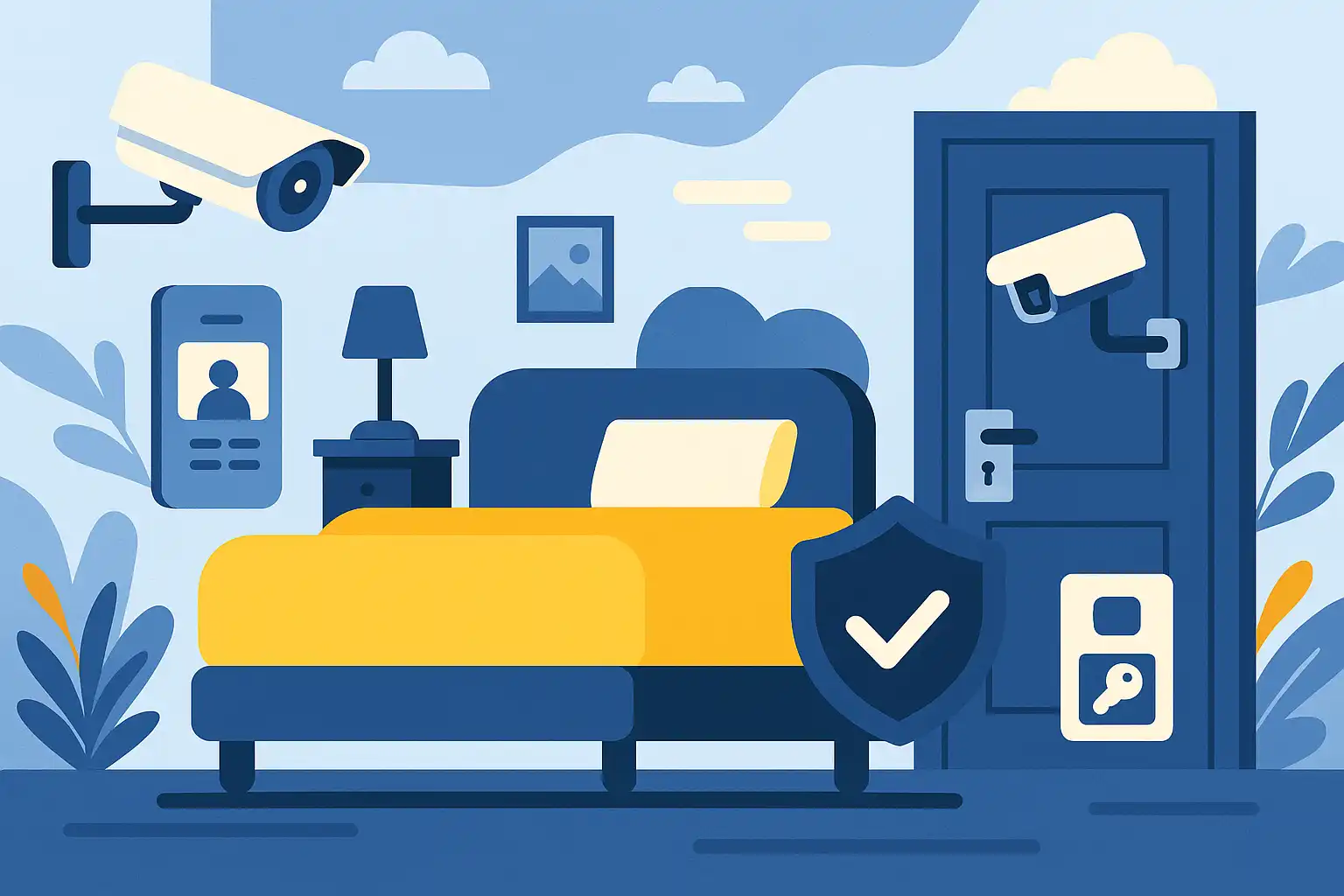
Hotel Security Systems: Modern Protection Solutions

Hotel Advertising: Complete Guide to Boost Bookings and Revenue
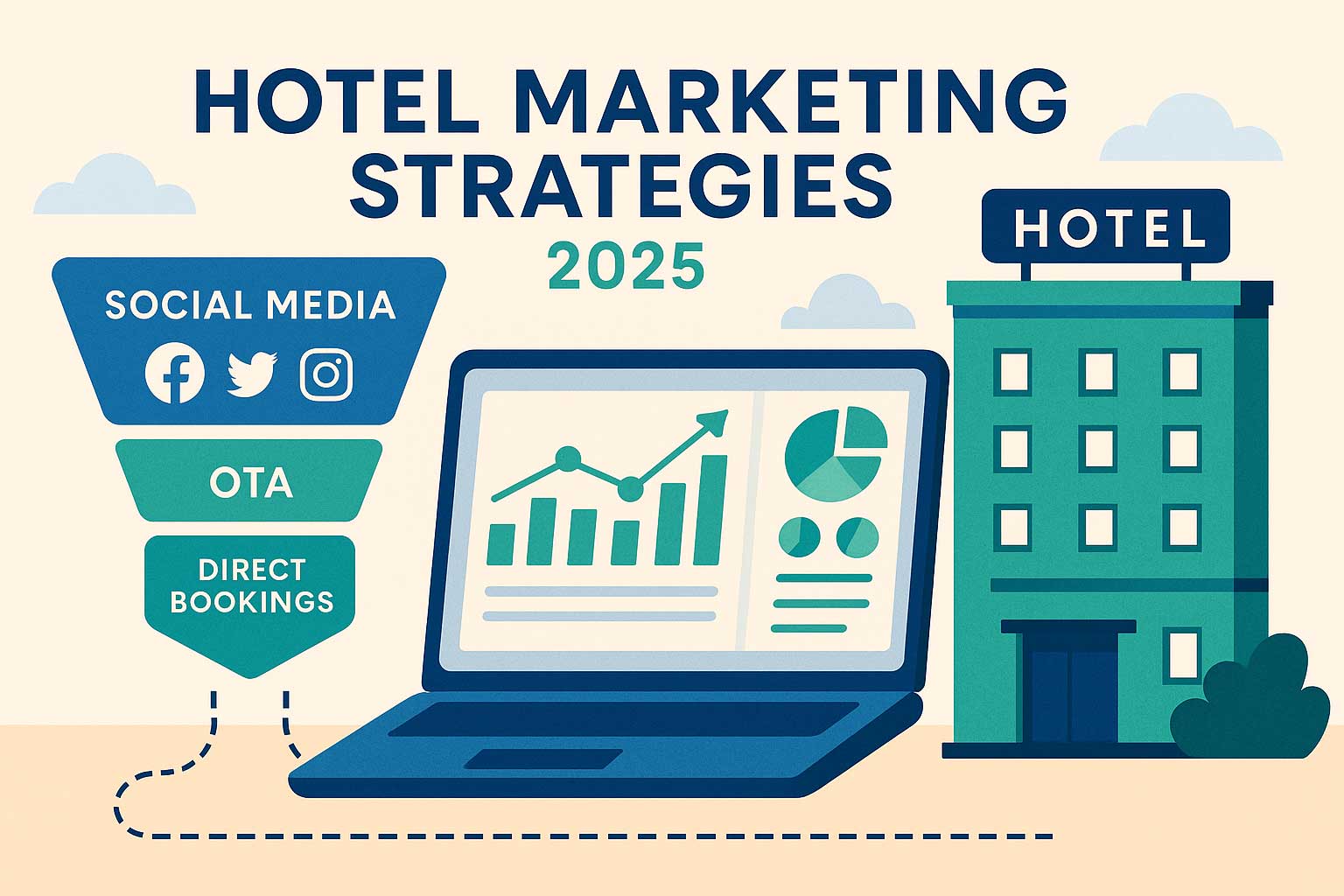
25 Hotel Marketing Strategy Ideas for 2025: Complete Guide

AI Reservation Agent: Revolutionizing Hotel Booking and Guest Experience

PMS Communication: Streamlining Property Management Through Effective Guest Messaging
Table of contents
The hospitality industry has seen some big changes since 2020, reshaping the way hotels think about sales and revenue. With online travel agencies charging hefty commission fees of 15-20% and guests booking just days before arrival instead of weeks, hotel managers are under more pressure than ever to sharpen their sales strategies and boost direct bookings.
Figuring out how to improve hotel sales today means taking a well-rounded approach—one that blends tried-and-true relationship-building with savvy digital tactics. Successful hotel sales strategies and teams now juggle everything from dynamic pricing and social media marketing to keeping that personal touch that makes hospitality stand out from other industries.
In this guide, you’ll find 15 tried-and-tested strategies that hotels of all sizes use to increase revenue, fill more rooms, and build a lasting edge over the competition. Whether you’re running a cozy boutique or managing a big hotel chain, these actionable tips will help you stay ahead of market trends and maximize your hotel revenue.
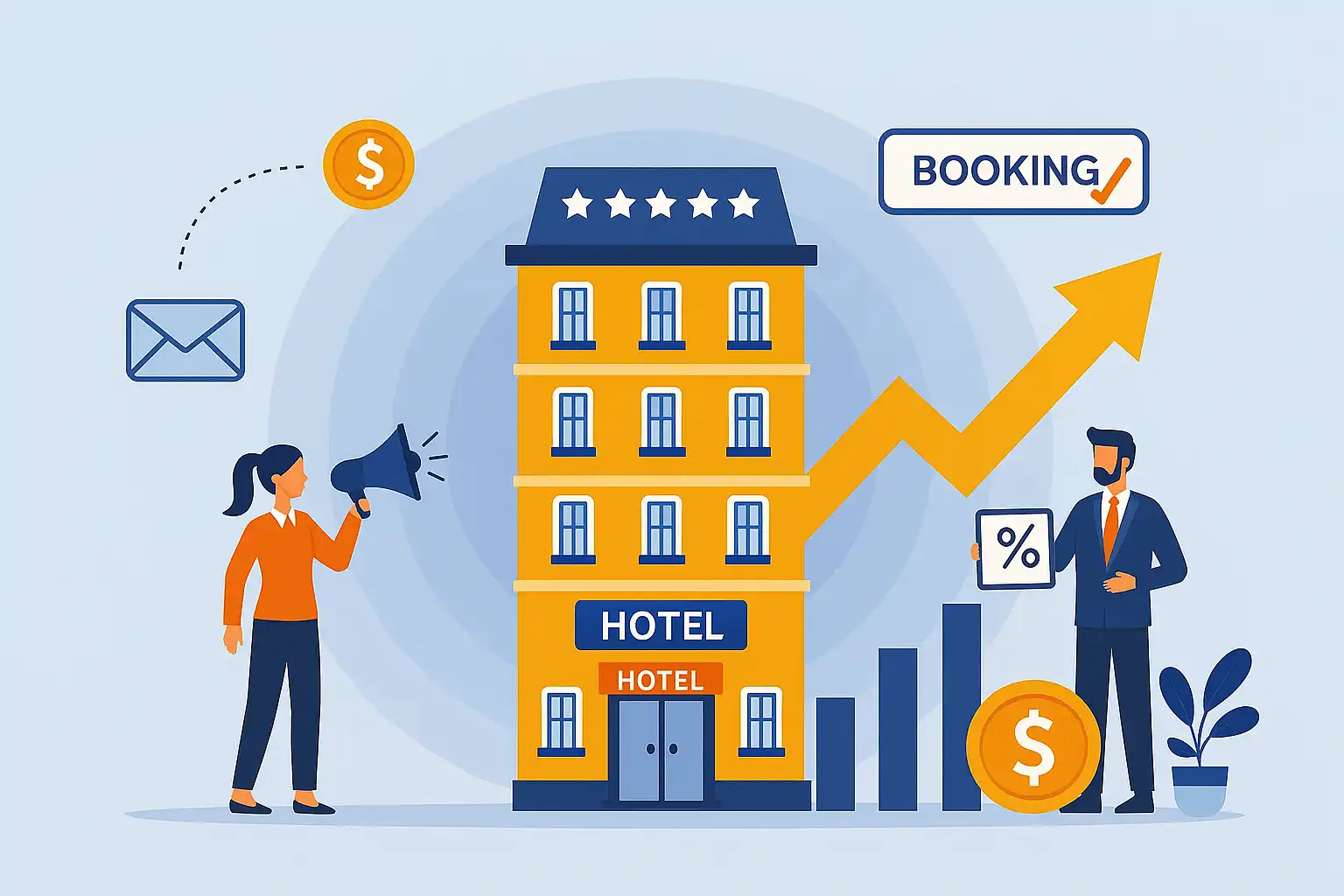
Understanding Hotel Sales Performance Today
The hotel industry landscape has shifted dramatically, bringing both challenges and exciting opportunities for hotel sales strategies and teams. The old-school ways of relying mostly on travel agent relationships and phone bookings have given way to digital-first approaches that focus on online visibility and engaging guests directly.
Current Hotel Sales Challenges
Today’s hotels face commission fees of 15-20% when working with online travel agencies, which can really eat into profits. Plus, many travelers now start their search on OTA sites instead of going straight to hotel websites.
Booking windows have gotten much shorter too—guests often book just 24-48 hours before arrival. This makes forecasting demand trickier and means hotel sales teams need to be nimble with pricing and room availability.
Since 2020, the shift to digital-first sales has sped up, pushing hotel managers to invest in new tech and retrain their teams. Those who don’t adapt risk falling behind competitors who are more digitally savvy.
The Digital Transformation Imperative
Today’s winning hotel sales strategies balance direct bookings with third-party distribution to get the best of both worlds: visibility and profitability. While OTAs are crucial for exposure, the real goal is to turn those browsers into direct-booking guests for future stays.
Top properties use smart property management systems that tie together booking engines, channel managers, and CRM tools. This tech combo streamlines the sales process and gives valuable data to inform decisions.
Key Performance Metrics
To really understand how your hotel’s sales are doing, keep an eye on these key metrics that show both current success and future potential:
| Metric | Industry Benchmark | Why It Matters |
|---|---|---|
| RevPAR (Revenue per Available Room) | $60-120 depending on market | Measures revenue efficiency |
| ADR (Average Daily Rate) | Varies by property type | Shows pricing effectiveness |
| Occupancy Rate | 65-75% annual average | Indicates demand capture |
| Direct Booking Percentage | 30-50% of total bookings | Controls commission costs |
| Conversion Rate | 2-5% website visitors to bookings | Reflects sales funnel success |
These numbers give you a full picture of your sales health and highlight where to focus your revenue management efforts.
Quick Wins to Boost Hotel Sales
If you’re looking to increase hotel sales fast, there are several strategies that often deliver noticeable results within 30-60 days. These quick wins focus on making the most of what you already have, without needing big investments or system overhauls.
Use Dynamic Pricing Strategies
Dynamic pricing lets hotels adjust room rates quickly—sometimes within 24-48 hours—based on real-time demand, what competitors are charging, and local market events. When done right, this can bump up RevPAR by 5-15%.
Keep an eye on local happenings like conferences or festivals to tweak your prices accordingly. For example, hotels near convention centers can raise rates during big events, while beach resorts might charge premiums during school holidays.
The trick is to balance smart pricing with guest trust—being transparent with your rates and offering guarantees helps keep guests happy while maximizing revenue.
Optimize Your Booking Engine
Many hotel websites lose potential revenue because their booking engines are clunky—on average, 85% of users abandon the process before booking. Making your booking process smoother can boost conversion rates by 15-25% without extra marketing spend.
Focus on these improvements:
- Keep bookings to three steps or fewer
- Make sure the design works well on smartphones
- Show real-time room availability and prices
- Offer secure payments with multiple options
- Clearly explain cancellation policies
Launch Targeted Upselling Campaigns
Upselling room upgrades, early check-in, and late checkout can add $25-75 to each booking’s value with little extra cost. Successful upselling includes pre-arrival emails with discounted upgrade offers, training front desk staff to suggest upgrades in person, and automated messages promoting spa or dining packages.
Run Limited-Time Flash Sales
Flash sales during slow periods—often Sunday through Tuesday for leisure hotels—can fill rooms that might otherwise sit empty. These sales should offer real value without undercutting your usual rates.
Try these tactics:
- Booking windows of 48-72 hours to create urgency
- Discounts of 20-30% off standard rates
- Minimum stay requirements to boost booking value
- Clear terms to protect peak pricing
Set Strategic Stay Requirements
During busy times and local events, requiring minimum stays (like 2-3 nights) helps maximize revenue. Make sure these rules are clear during booking and supported by your dynamic pricing strategy that reflects the premium value of these peak stays.
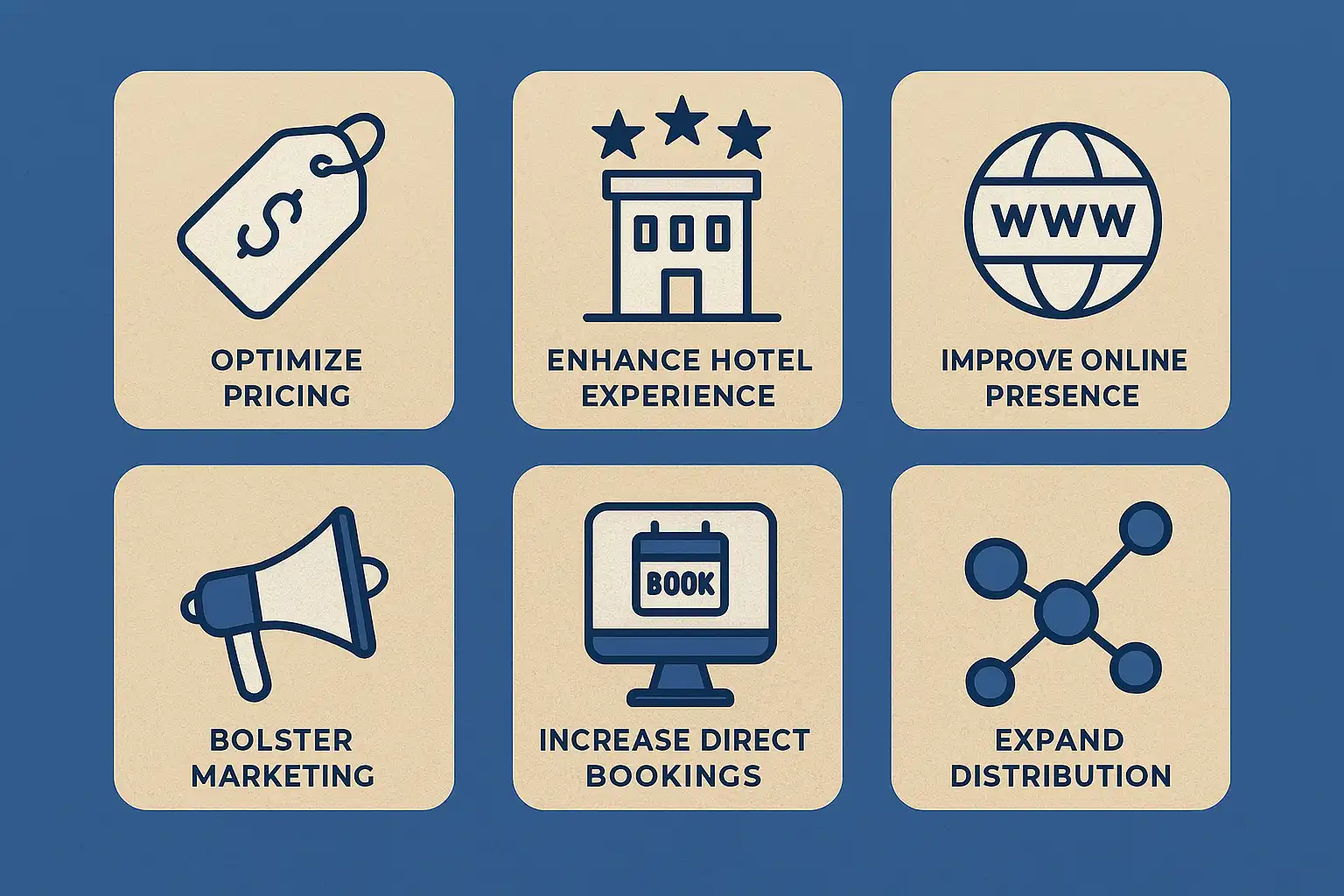
Digital Marketing to Drive Sales Growth
Hotel digital marketing is now a must-have for hotel sales strategies success, especially since 63% of travelers book accommodations via smartphones. Hotels need to optimize their online presence across channels to attract these mobile-first guests and turn them into loyal customers.
Make Your Website Mobile-First
Your hotel website is the cornerstone of your digital marketing and direct booking efforts. Since so many guests book on phones, mobile optimization isn’t optional anymore.
Key mobile features include:
- Fast page loads (under 3 seconds)
- Easy-to-use navigation and booking buttons
- Compressed images that still look great
- Simple forms that require minimal typing
- One-click booking for returning guests
Hotels that nail mobile optimization often see 25-40% jumps in mobile booking rates within three months.
Boost Your Local SEO
Local hotel SEO helps you catch “hotels near me” searches and other location-based queries from travelers ready to book. Optimizing your presence for local search helps you compete with OTAs and other hotels nearby.
Try these:
- Keep your Google Business Profile updated with photos and info
- Create content about local attractions and things to do
- Build citations on travel and business directories
- Encourage and respond to guest reviews professionally
- Use location keywords naturally in your website content
Engage on Social Media
Social media for hotels lets you showcase your hotel’s unique vibe and build emotional connections with potential guests. Go beyond pretty pictures by sharing:
- Behind-the-scenes glimpses of your team and hotel life
- User-generated content from happy guests
- Highlights of the local area and seasonal events
- Virtual tours and room showcases
- Real-time updates on amenities and services
Use Retargeting Ads
Retargeting ads bring back visitors who checked out your site but didn’t book. These ads typically convert at 2-3 times the rate of regular display ads because they target people who’ve already shown interest.
Make your retargeting ads count by:
- Showing rooms and rates they viewed
- Offering limited-time deals to encourage booking
- Including recent guest reviews for social proof
- Highlighting upcoming local events they might like
- Featuring clear calls-to-action linking to your booking page
Revenue Management and Pricing
Revenue management is one of the best ways to improve hotel sales without spending more on marketing. Smart pricing that takes competitor rates, local demand, and booking history into account can boost RevPAR by 10-20% annually.
Adopt Yield Management
Yield management helps you optimize both your room inventory and pricing to maximize total revenue, not just occupancy. It looks at demand patterns and competitor positioning to make smart decisions.
Try these strategies:
- Analyze year-round booking trends to spot demand shifts
- Check competitor prices weekly and adjust your rates
- Use stay restrictions during busy times
- Balance occupancy goals with average daily rate targets
- Forecast demand based on local events and seasons
Hotels using yield management often see 8-15% RevPAR improvements in their first year.
Use Revenue Management Software
Modern revenue management software automates pricing decisions and offers powerful analytics you couldn’t do by hand. These tools link with your property management system and channel managers for real-time pricing updates.
Look for software that offers:
- Automated competitor rate tracking
- Demand forecasting based on data
- Dynamic pricing updates several times daily
- Integration with booking engines and OTAs
- Detailed performance reports and dashboards
Apply Stay Restrictions Strategically
Stay restrictions like minimum nights help you maximize revenue during peak periods by encouraging longer bookings. Be sure to apply these rules thoughtfully to avoid upsetting business travelers or key guest groups.
Ideas include:
- Minimum 2-3 night stays on holiday weekends
- Arrival and departure limits during major local events
- Advanced booking rules for peak seasons
- Flexible exceptions for corporate and loyalty guests
- Clear communication about these rules when guests book
Keep an Eye on Competitors’ Pricing
Knowing what your competitors charge helps you price competitively and profitably. Monitor rates across OTAs and competitor sites regularly and adjust your pricing to stay attractive without leaving money on the table.
Do this by:
- Weekly rate checks on OTAs and competitor websites
- Analyzing their promos and packages
- Watching social media for announcements
- Tracking their occupancy when possible
- Benchmarking against similar local hotels
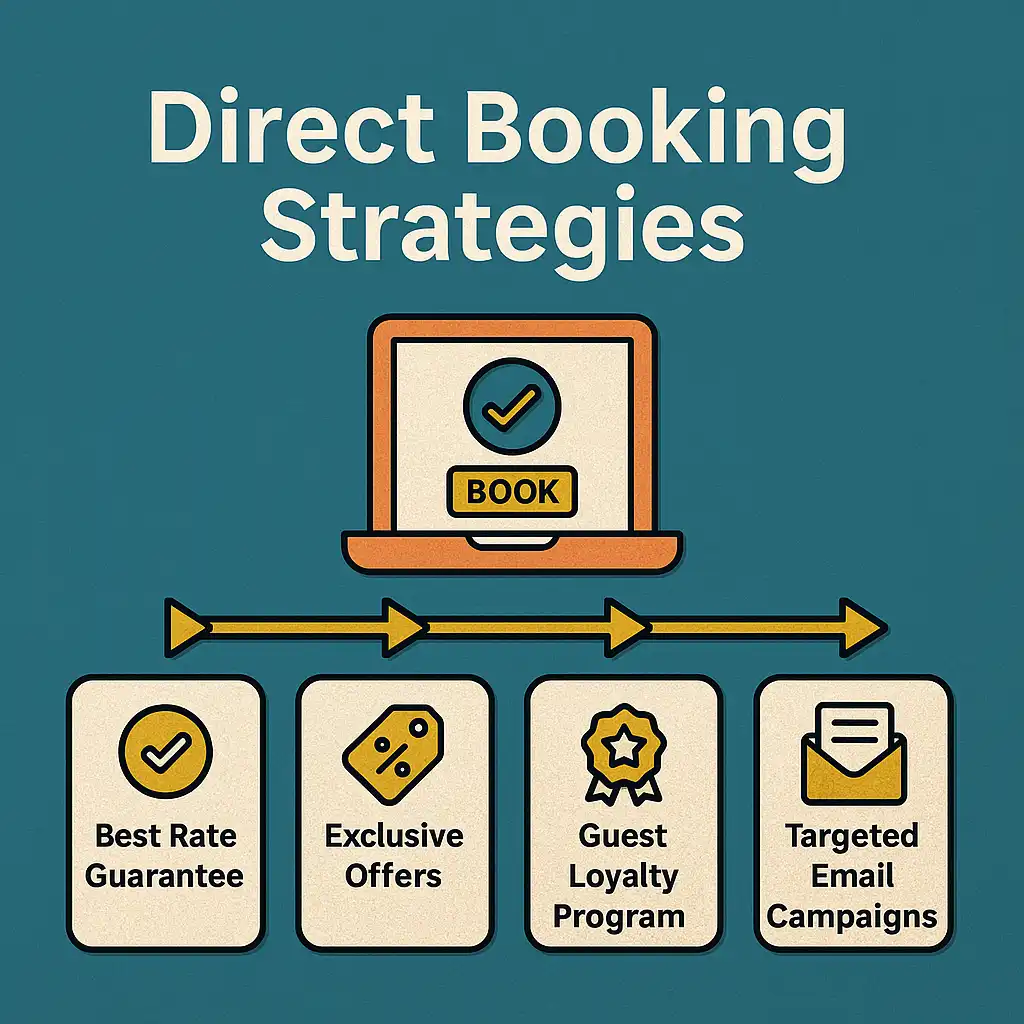
Direct Booking Strategies
Direct bookings are the most profitable for hotels since they avoid OTA commissions and give you more control over the guest experience. Even a 10% increase in direct bookings can significantly boost your net revenue.
Offer Exclusive Perks and Incentives
Give guests real reasons to book on your website instead of third-party sites by offering perks that add value without breaking the bank.
Try perks like:
- Free breakfast for direct bookers
- Upgraded WiFi service
- Flexible cancellation policies unavailable elsewhere
- Early check-in and late checkout options
- Complimentary room upgrades when available
Make sure these perks are front and center on your website and booking pages.
Manage Rate Parity
Keep your website’s rates consistent with other channels to build trust and encourage direct bookings. Use tools to monitor rates across platforms and offer:
- Best rate guarantees with clear terms
- Automated rate tracking on OTAs
- Member-only rates 5-10% below public prices
- Package deals exclusive to your site
- Flexible payment options not found on third-party sites
Automate Email Marketing
Email campaigns for hotels targeting past guests are cost-effective ways to generate repeat business and direct bookings. Automated sequences nurture relationships without constant manual effort.
Effective campaigns include:
- Welcome emails with local tips and upsell offers
- Pre-arrival messages with upgrade options and recommendations
- Post-stay follow-ups asking for reviews and encouraging returns
- Seasonal and event-based promotions
- Birthday and anniversary greetings with special deals
Create Member-Only Benefits
A simple loyalty program encourages direct bookings and repeat visits by offering exclusive perks. It doesn’t have to be complicated to work.
Examples:
- Member-only discounted rates
- Priority room assignments and upgrades
- Flexible booking and cancellation
- Exclusive access during busy times
- Personalized recognition during stays
Studies show repeat guests spend about 67% more per stay than newcomers, making loyalty programs a smart revenue booster.
Group Sales and Corporate Bookings
Group bookings and corporate clients bring steady revenue, often guaranteeing room blocks plus extra income from meeting spaces, catering, and services. Building strong ties with event planners and corporate travel managers pays off long-term.
Grow Corporate Client Relationships
Corporate travelers have different needs than leisure guests, so tailor your approach to convenience, reliability, and cost-effectiveness. Corporate contracts can fill rooms during slow times.
Try these:
- Build relationships with local businesses and travel coordinators
- Offer negotiated rates for guaranteed annual bookings
- Create business traveler packages with breakfast, meeting rooms, and flexible policies
- Provide express check-in and business center access
- Set up direct billing for approved accounts
Partner with Event Planners
Wedding, meeting, and event planners often book the same venues repeatedly if they get great service and pricing.
Strategies include:
- Offer all-inclusive meeting packages with rooms, catering, and AV
- Keep group booking policies flexible and fair
- Invite planners for site visits and walkthroughs
- Reward referrals with incentives
- Stay connected through industry events and groups
Target Sports Teams and Tournaments
Local sports events can bring big group bookings, especially near sports venues.
Approaches:
- Work with tournament and facility managers
- Offer team packages with group rates and meal options
- Provide meeting spaces for team meetings
- Assist with transportation logistics
- Market to regional and national sports organizations
Use Tiered Group Discounts
Encourage larger bookings while protecting profits with tiered discounts.
Example tiers:
- 10-15 rooms: 5% off best rate
- 16-25 rooms: 10% off plus free meeting space
- 26-50 rooms: 15% off plus catering credits
- 50+ rooms: Custom pricing and packages
- Always offer flexible payment and cancellation
Implement CRM Systems
CRM tools help sales teams track leads, manage planner relationships, and follow up consistently—key for complex group sales cycles.
CRM benefits:
- Centralized lead and follow-up management
- Automated reminders for proposals and renewals
- Historical booking data for repeat clients
- Sales team performance tracking
- Integration with property management for smooth bookings
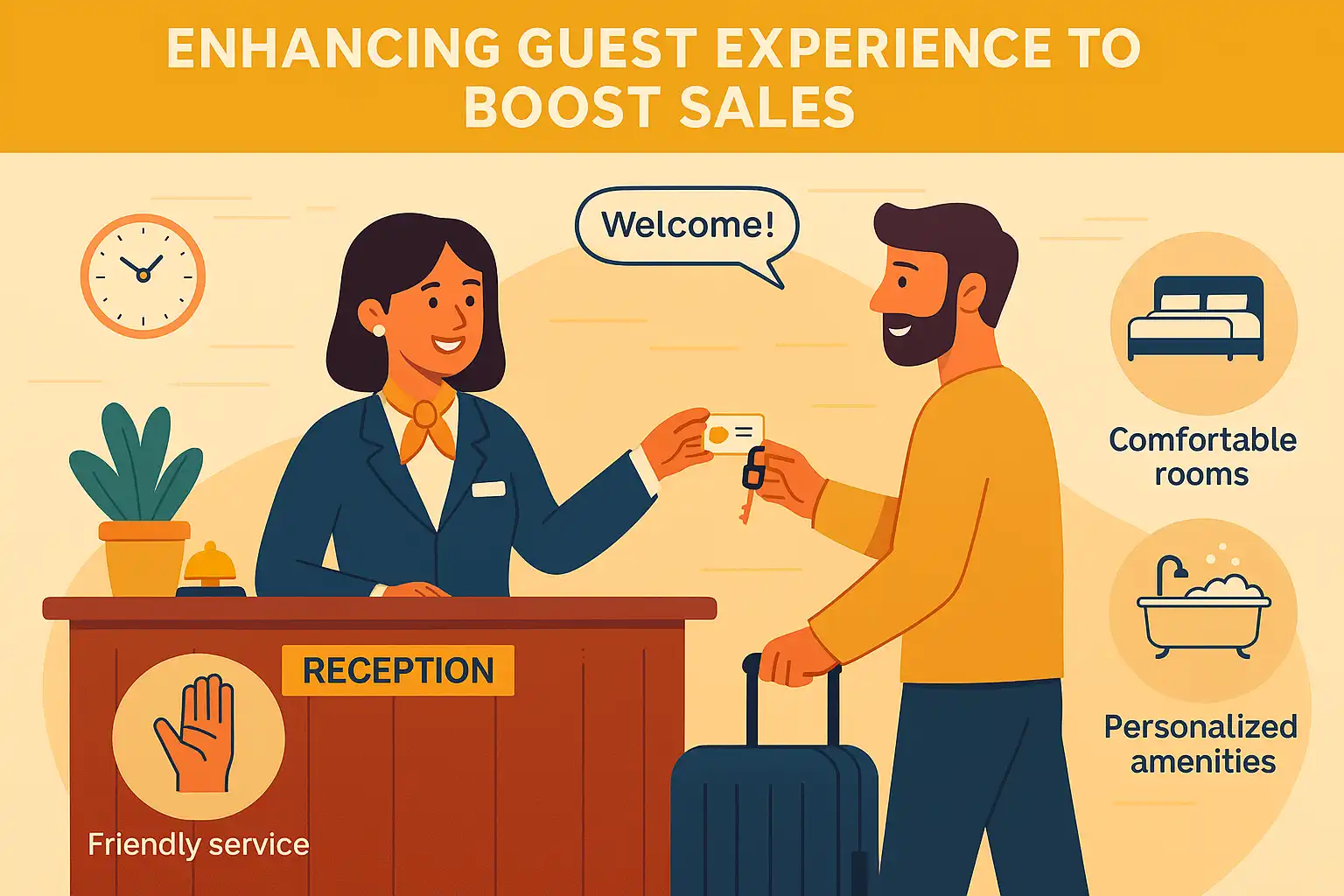
Enhancing Guest Experience to Boost Sales
Great guest experiences lead to more upsells, repeat bookings, and referrals. Hotels that focus on guest satisfaction consistently outperform competitors in occupancy and rates.
Pre-Arrival Communication
Use pre-arrival emails to enhance guest experience and boost revenue with smart upselling.
Ideas:
- Welcome messages with local weather and event tips
- Discounted room upgrade offers
- Spa and restaurant reservations
- Transport and attraction ticket bookings
Train Front Desk Staff on Upselling
Equip your front desk with skills to upsell without being pushy by focusing on guest needs.
Tips:
- Learn guest preferences from conversations and history
- Offer upgrades as solutions, not sales pitches
- Time offers well during check-in
- Use positive, benefit-focused language
Well-trained staff can increase upselling revenue by 15-25% in three months.
Personalize Guest Experiences
Use guest data to tailor experiences, showing you care and encouraging loyalty.
Examples:
- Assign rooms based on preferences
- Offer amenities matching guest profiles
- Suggest dining and activities suited to guests
- Recognize special occasions
Develop Loyalty Programs
Reward repeat guests with perks that encourage direct bookings and more spending.
Features:
- Points for stays and extras
- Tiered benefits that grow with loyalty
- Exclusive rates and offers
- Priority upgrades and amenities
- Personalized service
Repeat guests typically spend 67% more, making loyalty programs vital.
Integrate Guest Feedback
Use feedback to improve services and sales strategies.
Methods:
- Pre-departure surveys to fix issues early
- Post-stay surveys with incentives
- Monitor and respond to online reviews
- Engage on social media
- Train staff based on common feedback
Strategic Partnerships and Cross-Promotion
Partnering with local businesses boosts guest experiences and creates extra revenue streams, setting your hotel apart.
Local Restaurant Collaborations
Work with local eateries to create dining packages and exclusive discounts.
Strategies:
- Negotiate 10-15% guest discounts
- Offer dinner packages with transport and reservations
- Develop wine tastings and culinary tours
- Provide priority seating for guests
- Promote partners through your marketing
Activity and Attraction Partnerships
Partner with tour operators and attractions for guest discounts and packages.
Ideas:
- Exclusive attraction discounts
- Package deals with tickets included
- Private tours
- Transportation bundles
- Seasonal promotions tied to events
Transportation Partnerships
Work with transport companies to offer shuttles and car services.
Approaches:
- Airport shuttles with advance booking deals
- Ride-share partnerships
- Car rentals on-site or delivery
- Private cars for premium guests
- Public transport info and tickets
Corporate Partnerships
Build relationships with local businesses for steady employee travel and events.
Benefits:
- Negotiated employee rates
- Meeting space for corporate events
- Executive lodging programs
- Corporate memberships with perks
- Cross-referrals with related businesses
Package Deals and Promotions
Create attractive packages that combine rooms with extras to increase booking value and guest satisfaction.
Seasonal Packages
Capitalize on local events and holidays with timely offers.
Examples:
- Winter wellness retreats
- Summer family fun with activities and dining credits
- Holiday-themed celebrations
- Spring outdoor getaways
- Fall foliage tours
Romance and Special Occasion Packages
Offer premium experiences for couples and special events.
Includes:
- Suite upgrades
- Champagne and chocolates
- Couples spa treatments
- Private dining
- Special room decorations
Business Traveler Packages
Cater to corporate guests with convenience and services.
Features:
- Express check-in and late checkout
- Complimentary breakfast and coffee
- Business center and meeting rooms
- High-speed internet and workspaces
- Laundry and dry cleaning
Experience Bundles
Combine spa, dining, and local activities for all-inclusive deals.
Examples:
- Wellness packages
- Culinary experiences
- Adventure outings
- Cultural tours
- Family-friendly activities
Promotion Timing
Time your offers to maximize impact without hurting peak rates.
Tips:
- Shoulder season specials
- Early booking discounts
- Last-minute deals
- Group promotions
- Loyalty member exclusives
Technology and Automation
Integrate tech to streamline operations, enhance guest experiences, and boost sales efficiency.
Property Management Systems
Use PMS that sync with booking engines and channel managers for smooth sales.
Look for:
- Real-time inventory updates
- Automated rate changes
- Guest history tracking
- CRM integration
- Revenue analytics
AI and Chatbots
Deploy chatbots for quick guest responses and upselling.
Capabilities:
- Instant answers to booking questions
- Personalized upsell suggestions
- Local info and recommendations
- Service requests handling
- Lead capture for sales follow-up
Email Automation
Automate emails to nurture guests and drive repeat bookings.
Include:
- Welcome sequences
- Pre-arrival upsells
- Post-stay review requests
- Seasonal promotions
- Special occasion greetings
Analytics and Reporting
Use analytics to track bookings, guest behavior, and revenue.
Focus on:
- Booking source analysis
- Guest journey tracking
- Revenue forecasting
- Competitor benchmarking
- Sales team performance
Contactless Tech
Offer contactless check-in/out to improve convenience and free staff for sales.
Benefits:
- Mobile check-in with digital keys
- Upselling during digital check-in
- Contactless payments
- Digital concierge services
- Feedback collection
Online Reputation and Review Management
Online reviews heavily influence bookings—95% of travelers read them first. Managing your reputation means encouraging positive reviews and handling negative feedback professionally.
Review Monitoring and Responses
Respond to reviews on TripAdvisor, Google, and OTAs within 24 hours to show you care and fix problems quickly.
Best practices:
- Personalize replies to all reviews
- Acknowledge specific guest comments
- Offer offline solutions when needed
- Thank guests for positive feedback
- Use reviews to improve operations
Encourage Guest Reviews
Ask happy guests to leave reviews via follow-up emails and incentives.
Strategies:
- Post-stay emails with direct links
- Rewards like points or discounts
- Staff requests at checkout
- Social media campaigns
- Surveys that turn into reviews
Reputation Recovery
Handle negative feedback promptly to turn unhappy guests into future customers.
Approaches:
- Apologize sincerely
- Share action plans to fix issues
- Follow up to ensure satisfaction
- Train staff to prevent repeats
- Communicate improvements made
Use Review Insights
Analyze feedback to spot service gaps and opportunities.
Applications:
- Identify training needs
- Recognize star employees
- Understand guest preferences
- Plan facility upgrades
- Tailor marketing messages
Social Media Reputation
Monitor and engage on social platforms to manage your image.
Tactics:
- Track mentions and hashtags
- Share user content
- Respond professionally to complaints
- Create positive hotel stories
- Build influencer relationships
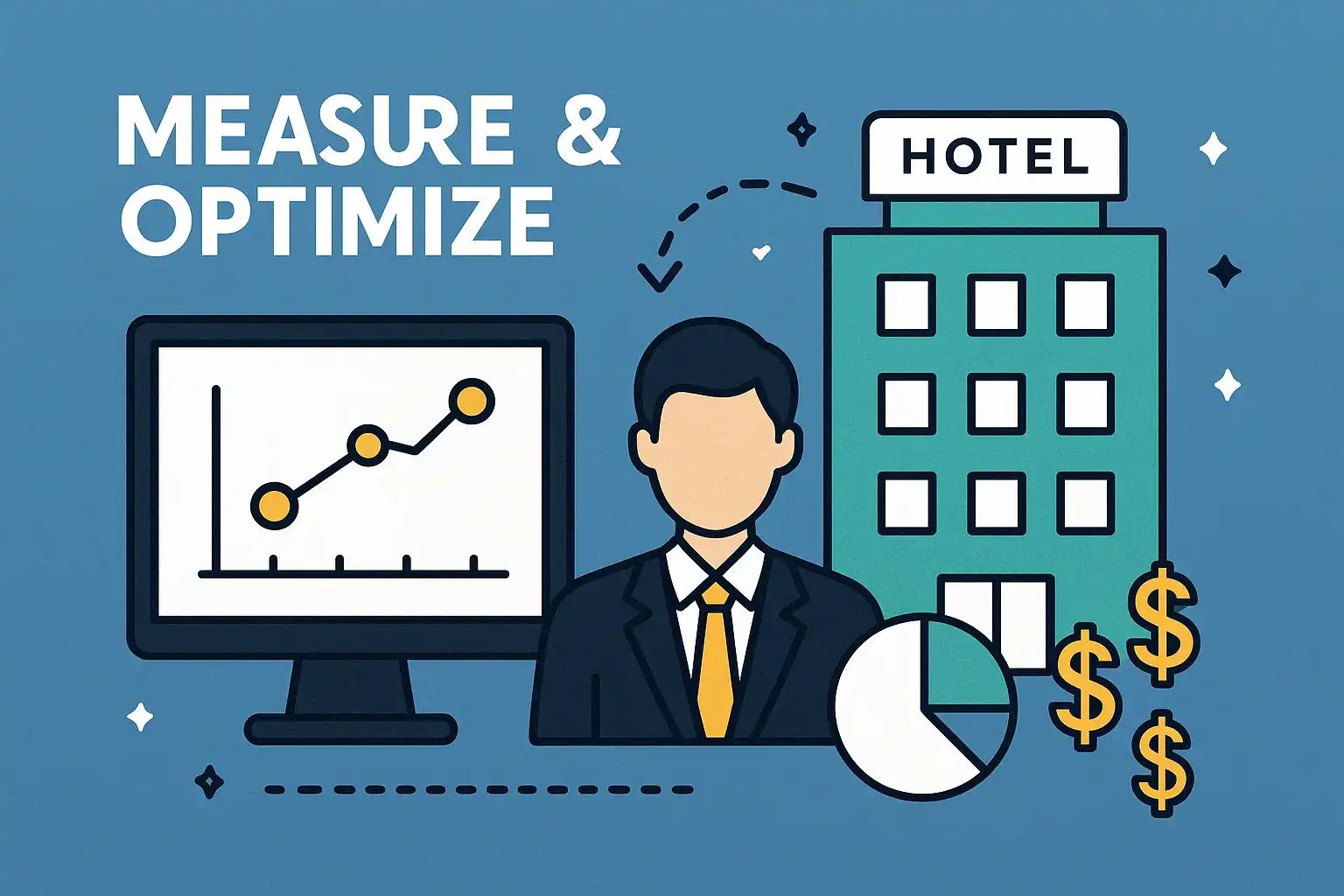
Measure and Optimize Sales Performance
Keep improving by tracking key sales metrics regularly.
Key Performance Indicators (KPIs)
Monitor these to gauge success:
| Metric | Frequency | Target Range | Purpose |
|---|---|---|---|
| Occupancy Rate | Daily | 65-85% | Measure demand |
| Average Daily Rate (ADR) | Daily | Market dependent | Optimize pricing |
| Revenue per Available Room (RevPAR) | Daily | Market dependent | Overall performance |
| Direct Booking Percentage | Weekly | 35-55% | Channel effectiveness |
| Website Conversion Rate | Weekly | 2-5% | Digital success |
| Guest Satisfaction Score | Monthly | 4.0+ out of 5.0 | Experience quality |
Conversion Rate Analysis
Look at how many website visitors actually book and find ways to reduce drop-offs.
Focus on:
- Fixing pages with high abandonment
- Testing booking engine setups
- Comparing mobile vs desktop results
- Trying different promotions
- Noticing seasonal patterns
Booking Lead Time Analysis
Understand when guests book to time your marketing and pricing.
Consider:
- Average booking windows by guest type
- Seasonal booking shifts
- Local event impacts
- Lead time vs daily rate
- Early booking incentives
Monthly Reviews
Hold monthly meetings to review sales results and plan ahead.
Include:
- Performance vs goals
- Marketing ROI
- Competitor activity
- Successful strategies
- Upcoming opportunities
A/B Testing
Test different pricing, marketing, and website changes to find what works best.
Examples:
- Pricing offers
- Website layouts
- Email subject lines
- Social media content
- Upsell timing
Conclusion
Improving hotel sales today means combining the best of traditional hospitality with smart digital strategies. The 15 strategies here offer a clear path to increase revenue, delight guests, and build a strong competitive advantage.
Top hotels use several tactics at once, creating synergy between direct booking, revenue management, guest experience, and marketing. While OTAs remain important for exposure, the real win is turning those guests into direct bookers who boost your bottom line.
Focus on mobile optimization, direct booking perks, dynamic pricing, guest loyalty, and tech-driven operations to stay ahead in this fast-changing industry.
The hospitality world keeps evolving, and so do guest expectations. Hotels that invest in technology, staff training, and guest experience innovation will be the ones thriving long-term.
Start today with quick wins like booking engine tweaks and dynamic pricing, then build out loyalty programs and partnerships that create lasting success. Your hotel’s revenue growth awaits!
